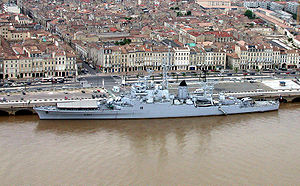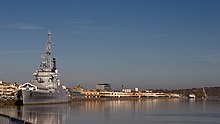French cruiser Colbert (C611)
This article needs additional citations for verification. (March 2021) |
 Colbert in the port of Bordeaux in its time as a museum ship (2006)
| |
| History | |
|---|---|
| Name | Colbert |
| Namesake | Jean-Baptiste Colbert |
| Ordered | 1953 |
| Builder | Brest Arsenal |
| Laid down | 9 June 1954 |
| Launched | 24 March 1956 |
| Commissioned | 5 May 1959 |
| Decommissioned | May 1991 |
| Homeport | Brest |
| Fate | Scrapped 2016 |
| General characteristics (as built) | |
| Type | Cruiser |
| Displacement | 9,084 t (8,941 long tons) standard, 11,587 t (11,404 long tons) full load[1] |
| Length | 180.5 m (592 ft 2 in)[1] |
| Beam | 19.7 m (64 ft 8 in) (waterline)[1] |
| Draft | 6.5 m (21 ft 4 in) (max)[1] |
| Installed power | 4 x Indret boilers[1] |
| Propulsion | Parsons geared steam turbines, 2 shafts, 86,000 PS (63,253 kW)[1] |
| Speed | 32 knots (37 mph; 59 km/h)[1] |
| Range | 7,100 nmi (13,100 km) at 18 kn (21 mph; 33 km/h)[1] |
| Complement | 977 (as flagship)[1] |
| Sensors and processing systems | |
| Electronic warfare & decoys | |
| Armament |
|
| Armour | |
| General characteristics (1972) | |
| Type | Guided missile cruiser |
| Complement |
|
| Armament |
|
Colbert (C 611) was an anti-air cruiser, later transformed into a missile cruiser, of the French Navy. She was the sixth ship (and second cruiser) of the French Navy to be named after Jean-Baptiste Colbert (the previous one was scuttled at Toulon in 1942). She served in the Navy from 1956 to 1991, before being converted into a museum ship at Bordeaux from 1993. Colbert was scrapped in 2016.
Colbert was the last French warship designated as a "cruiser". Afterward, the French Navy adopted the term "frigate".[1]
Design and description
[edit]This section needs expansion. You can help by adding to it. (October 2024) |
General characteristics
[edit]Propulsion
[edit]Armament
[edit]Fire control
[edit]Protection
[edit]History
[edit]Development
[edit]
In 1946 and 1947, the French Navy planned to have six conventional and six anti-air cruisers; afterward, the navy only managed to complete De Grasse and build the new Colbert, authorized in 1953[2] with the project designation "C53".[1] Colbert was a purpose-designed anti-air warfare ship[2] based on De Grasse, with a mixed armament of 127 mm and 57 mm guns.[1] Colbert was laid down at the Brest Arsenal on 9 June 1954, launched on 24 March 1956, and entered service on 5 May 1959.[1]
Early service
[edit]Early in her career, Colbert served as flagship of the French Mediterranean squadron (escadre de Méditerranée) at Toulon.[1]
In 1961, she repatriated the remains of Marshal Hubert Lyautey from Morocco to France.[citation needed]
In late-1964, President Charles de Gaulle made official visits to South America; transportation was partially provided by Colbert.[3]
In 1967, Colbert conveyed President de Gaulle to Canada for Expo 67. The visit was cut short after De Gaulle provoked an international incident by delivering a speech supporting Quebec separatism.[citation needed]
Post-refit
[edit]
Colbert was modernized and converted into a missile cruiser from 1970 to 1972. The 127mm guns were replaced by the Masurca surface-to-air missile system and 100mm dual-purpose guns.[1] Afterwards, she was based at Brest from 1973 to 1976, and then at Toulon.[1]
Colbert represented France at the bicentennial festivities in Australia in 1988.[citation needed]
In 1991, Colbert participated in the 1991 Gulf War (Opération Salamandre), the only time she participated in a combat operation.[citation needed] She was decommissioned late that year on 24 May.[1]
Museum ship
[edit]
Colbert was a museum and monument historique at Bordeaux from June 1993 to 2007. The ship remained owned by the state; the museum was run by the private association "The Friends of the Colbert". Guided tours provided access to areas - like the engine rooms and cabins - normally closed to the public. There were permanent exhibits on the Navy and Météo-France. Architectural models were also displayed; visitors could see modellers at work. The galley served an enclosed restaurant and dance-room built on the foredeck. The ship's siren was sounded at midday every Wednesday and Sunday.[citation needed]
The museum experienced chronic financial problems and could not afford the necessary security and maintenance. For example, it could not afford the €500,000 needed for repainting. The museum closed on 2 October 2006 due to a lack of funding and pressure from the municipal government and local interest groups.[citation needed]
Scrapping
[edit]

On 31 May 2007, when the concession to the "Friends" expired, Colbert was towed to the mothball fleet in Landevennec. She was cannibalized for parts, mainly from the boilers and turbines, to maintain the helicopter-carrier Jeanne d'Arc; the cruiser became surplus when Jeanne d'Arc was decommissioned in September 2010. On 5 June 2016 Colbert arrived under tow at Bassens, River Gironde for scrapping.[4]
References
[edit]Citations
[edit]- ^ a b c d e f g h i j k l m n o p q r s t u v w x y z aa ab ac ad ae af ag Jordan and Moulin, page 227
- ^ a b Jordan and Moulin, page 226
- ^ "DEGAULLE BEGINS TRIP TO 10 NATIONS OF SOUTH AMERICA; Flies to Guadeloupe on Way to Venezuela—Rigorous Schedule Worries Aides; GENERAL'S AGE IS CITED; Tour Welcomed by U.S.—Washington Hopes it Will Aid Anti-Castro Fight". The New York Times. 21 September 1964. Retrieved 5 March 2021.
- ^ "Le Colbert est arrivé dimanche soir pour être démantelé". Sud Ouest (in French). 6 June 2016. Retrieved 20 June 2016.
Bibliography
[edit]- Jordan, John; Moulin, Jean (2013). French Cruisers 1922-1956. Seaforth Publishing. ISBN 978-1-84832-133-5.
